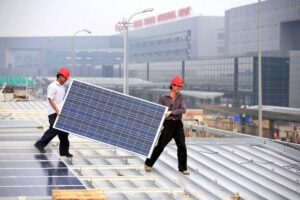Greens leader Adam Bandt has called on the Albanese government to reject the use of any further carbon offset “accounting tricks,” after a report from the Climate Change Authority recommended Australian companies be allowed to buy international carbon credits.
The Review of International Offsets, published by the CCA on Thursday, calls for the establishment of a National Carbon Market Strategy so Australia can tap into the evolving international carbon market and seize the opportunity to boost emissions reduction.
“It makes sense – and it is in Australia’s national interest – to play a leading role in the development of a liquid, high integrity and effective global carbon market,” said CCA CEO Brad Archer.
“Bringing voluntary and compliance carbon markets together could help accelerate global decarbonisation and enhance the integrity of carbon offsets.”
But the Greens say the “Morrison-era report” was commissioned by former federal energy minister Angus Taylor to justify its use of Paris accounting tricks, and “should be binned.”
The comments refer to the Morrison government’s plan to use up to 411 million in “surplus” credits from its 2020 emissions reduction target under the Kyoto towards meeting its subsequent 2030 target under the Paris Agreement.
The proposal attracted stiff criticism, both from within Australia and abroad, as a cynical shortcut to meeting the 2030 target, rather than taking substantive action to reduce Australia’s greenhouse gas emissions.
“We need to cut emissions here in Australia so that we get the benefits of transitioning to a zero economy,” says Bandt.
“These international offsets just delay action and could also undercut our farmers, who could earn income from helping draw down pollution locally.”
Bandt’s concerns around the international carbon offset market are no doubt influenced by recent claims from ANU professor and carbon market expert Andrew Macintosh that Australia’s local carbon offset market is effectively a “rort,” with up to 80% of offsets “markedly low in integrity.”
As Western Sydney University’s Declan Kuch wrote here in April, integrity issues have plagued carbon trading schemes and offsets since they first emerged in the mid 1990s.
“Polluting industries want low-cost compliance with climate laws – and poor quality offsets satisfy this demand,” Kuch wrote.
But the CCA report, which took advice from EY, Gilbert + Tobin and the Clean Energy Regulator, among others, puts a strong emphasis on the quality of offsets and stresses that any dodgy accounting tactics should be carefully weeded out.
“It’s important that offsets have integrity and that they are not double counted, for example. Our review of the criteria applied to international carbon offsets will provide confidence in the quality and integrity of carbon offsets being used here,” the report says.
But these assurances of oversight and integrity from the CCA are not enough to quell Bandt’s concerns about a market that could allow some parties to make a lot of money, while giving other parties wriggle room to continue emitting.
“Some of these supposed ‘carbon credits’ are nothing but hot air: they don’t represent real cuts to emissions, they get traded hundreds of times, and they give corporations a free pass to keep pumping pollution into the atmosphere,” said Bandt on Thursday.
“If we want to turn the tide on climate breakdown we need to see negative emissions, with more carbon drawdown through reforestation than pollution output. The time for ambition is now and we can’t waste time on schemes that achieve net nothing.”
Tangible carbon emission reductions are particularly important for Australia since the Albanese Labor government’s upping of national climate targets, through its soon to be legislated pledge to cut emissions by 43 per cent by 2030.
But CCA chief Archer says high integrity offsets can help nations and companies to set more ambitious targets and accelerate decarbonisation beyond what‘s achievable from direct emissions reductions.
“This is particularly the case for very hard-to-abate emissions. Offsets can help smooth the transition away from emissions intensive activities, and put the necessary ‘net’ in net zero emissions by 2050.
“Carbon markets also provide a means of channelling public and private finance to support our regional neighbours leapfrog the emissions-intensive economic development trajectories of industrialised nations.”
John Connor, CEO of the Carbon Market Institute, says his first impression of the CCA report is that it has mostly sensible recommendations of how Australian companies can play a role in the carbon negative world.
“We definitely need credible carbon reduction, but we should definitely be supporting companies that want to do something to offset their emissions while they transition to net zero,” Connor said.
“It’s important that Australia – governments, businesses and communities – are active participants in the market rules that are being established, whether we like it or not, for our region and the international carbon market,” he added.
Emma Herd – a carbon market expert and key advisor to the CCA report through her role as EY Oceania, Climate Change and Sustainability Partner – says the timing couldn’t be better for a report like this – and particularly its recommendation for a national strategy.
Herd says that the conversation around how you guarantee integrity in international carbon trading schemes is “a debate that we have to have.” But she also believes carbon trading will be integral to the world’s efforts at reining in global warming.
“If we are to have any hope at all of limiting global warming to 1.5°C, carbon markets have to be a part of our tool kit,” Herd told RenewEconomy. “But we do have to make sure that [offsets] are doing what they promise and cutting emissions at their source.”








